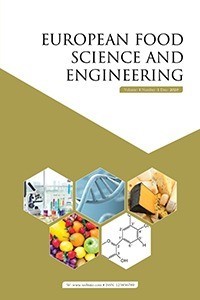
European Food Science and Engineering
Yazarlar: ["Jasper Okoro Godwin ELECHI", "Ikechukwu U. NWİYİ", "Emmanuel J. OBOH"]
Konular:-
DOI:10.55147/efse.1181022
Anahtar Kelimeler:Diet-diversity,Functional Properties,Fermentation,Mango Mesocarp Flour
Özet: Processing of plant foods has been in practice over a long period of time for various reasons; ranging from optimization of product quality, such as improvement in flavour, texture, nutrient density, and bioavailability as well as reduction in viscosity, bulkiness, and antinutritional factors/toxins or for improvement of functional properties for use in other food systems. Indigenous food fermentation is one of the oldest ‘food biotechnological processes’ dependent on the biological activity of microorganisms from which the development of fermented foods is achieved in the cultural history of human beings. Mango (Mangifera indica) is a tropical fruit plant that contains high levels of nutrients, fibre, macronutrients, micronutrients, and minerals as well as abundant bioactive compounds such as antioxidants and polyphenols reported to be an alternative to enhance body immunity. This study is to process fermented mango pulp flour and the effects of the period of fermentation time on the chemical composition and selected functional properties of mango pulp flours were examined. The fermentation time ranged from 0-72 h with Flour of the unfermented (0hr) Mango serving as control. Fermentation for 24hr to 72hrs significantly increased (p<0.05) crude protein and total ash in the flours. Ether extract and carbohydrates significantly decreased (p<0.05) in the flours with an increase in fermentation time. Significant (p<0.05) reduction in Bulk density, swelling index, and water absorption capacity occurred in the flour with fermentation. There was a significant (P<0.05) increase in Vitamin C and beta–carotene content of the fermented samples and this was constant as fermentation progressed across all the samples. Therefore, fermented mango flours have a great potential to be developed into healthy foods since antioxidants have the ability to improve immunity and anti-inflammatory response.